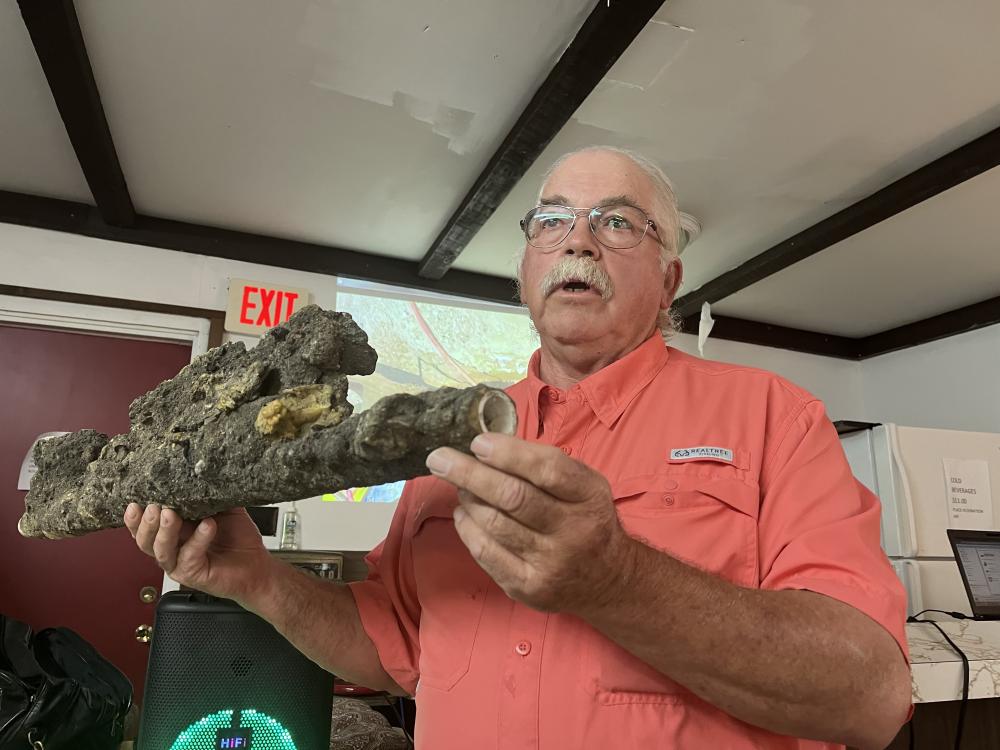Danny Warren details Swifts Beach pipe plan
Forget the grinder pumps.
Local businessman Danny Warren explained his proposed plan for the long-suffering sewer system under Wankinquoah Avenue during a meeting at the Swifts Beach Community Center on Thursday, June 8.
Three companies are vying to get the contract with the town to do the work, Warren’s included. If Warren gets the contract, he would install two new pipes and a new gas line under Wankinquoah Avenue. A special resin that expands and hardens when it touches water would be used to prevent asbestos from the old pipe from escaping. The entire road would then be repaved under a different contract.
“You wind up with a new welded-together plastic sewer system that will never ever leak again,” Warren told the packed hall.
The project would need MassDEP’s approval because it would bypass laws that require asbestos pipes to be unearthed and disposed of.
Some Swifts Beach residents were concerned about being “guinea pigs” for the replacement, which Warren said would be the first of its kind anywhere in the world.
Sewer Commission Chair Bernard Pigeon said that to have even gotten this far, the plan had to go through a long approval process. This process involved work from multiple parties, including Warren, his company, town officials and the Sewer Commission.
Warren said he and his team have been treating the plan like a “nuclear project,” and that he has invested $2 million of his own money into it. Warren, owner of the Warren Environmental epoxy coating company, has previously invested some of his fortune into an under-construction marina and events space on Main Street, taking advantage of a federal program which allows him to avoid capital gains taxes by investing in “low-income” communities like Wareham.
“I would have never put the kind of money up that I did,” he said, “if I didn't absolutely believe this was going to work.”
The repairs are necessary because the sewer line under Wankinquoah Avenue collapsed in 2016. In response, the town made plans to replace the gravity sewer system with an electronic low-pressure system.
This would have required 130 homeowners to purchase sewage-grinding pumps, which could have cost them anywhere from $400 to $4,000. Residents were not satisfied and wanted other options.
At its meeting on Thursday, May 4, the Sewer Commission canceled the original contract for the project that would have resulted in the installation of the pumps.
Warren said that if his plan is not approved, the town would have to resort to the grinder pumps or complete a full-scale dig, which would include replacing the entire sewer pipe.
Warren’s plan would be to insert a new pipe into the old sewer pipe, which extends 289 feet between two manholes.
The old pipe has asbestos. If completely removed, it would have to be shipped to Idaho for an expensive disposal process.
With the new process, only 30 of the 289 feet would have to be dug up and sent to Idaho.
As a solution for the remaining pipe, Warren demonstrated a resin that can seal anything that tries to escape, including asbestos.
When the resin reacts with water, Warren said, it “basically explode[s] and turn[s] into a plastic very, very, very quickly” encapsulating the old pipe while pulling the new one into place.
Prior to the work on the old pipe, a new pipe would be inserted four feet above the old pipe at an angle.
“We're not going to abandon that asbestos pipe down below,” Warren said. “We're going to use this new process to score it, spread it and put a brand new pipe in.”
There would be new pipe connections going to each of the properties between the two manholes.
Due to the asbestos, Warren said homeowners should identify whether the pipes leading up from under their homes contain asbestos and, if so, should hire a licensed asbestos abatement contractor to wrap the pipes before the EPA forces them to do so.
Warren anticipates that once it starts, the project would be completed in three weeks — if National Grid can locate and replace the gas line in that time.
Warren said that during construction, no resident would lose access to the sewer system or water. However, regular traffic on Wankinquoah Avenue would be blocked off and only emergency vehicles would be able to pass during construction. The new road would be paved in the fall.













